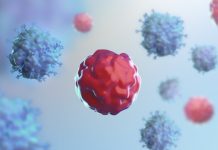
A study from Karolinska Institutet has identified a potential antibody drug candidate for the treatment of non-alcoholic fatty liver disease.
Currently, there is no drug for non-alcoholic fatty liver disease, which affects people with type 2 diabetes and can lead to other serious liver conditions. The researchers have identified an antibody that can block the protein VEGF-B presents, opening the door to possible therapeutic options for the condition.
The study has been published in the Journal of Hepatology.
Fatty liver disease is a serious condition
“Fatty liver is associated with several serious and sometimes fatal diseases. With the therapeutic principle that we’ve developed, it might be possible to prevent fatty liver and hopefully lower the risk of liver failure and terminal liver cancer,” said Annelie Falkevall, the study’s first author and a researcher at the Department of Medical Biochemistry and Biophysics and Karolinska Institutet.
Obesity and overweight aremajor global health issues that have caused a significant rise in the incidence of type 2 diabetes. According to the Swedish Diabetes Association, there are 500,000 cases of diabetes in Sweden, of which 85-90% are type 2.
Chronic overweight and type 2 diabetes can increase the risk of non-alcoholic fatty liver disease, which is the most common cause of liver-related conditions, such as liver failure and liver cancer, in Europe and the U.S.
White adipose tissue can store energy in the form of lipids, but in people with chronic obesity and type 2 diabetes, white adipose tissue struggles to perform this function. This leads to an increase in the concentration of fatty acids in the blood.
The body is then forced to store this energy elsewhere, including in the liver.
The accumulation of this fat in the liver interferes with the secretion of glucose and leads to insulin resistance. In turn, this increases the danger of permanent damage to the liver.
Non-alcoholic fatty liver disease affects over 100 million adults, and past research has suggested that people with the condition are 17 times more likely to be diagnosed with liver cancer.
Testing the drug candidate
In the study, the researchers accessed a drug candidate in the form of an antibody to the protein VEGF-B (Vascular Endothelial Growth Factor B), which is responsible for the release of fatty acids from white adipose tissue.
“We’ve identified a new method of treating fatty liver disease that involves keeping the fatty acids in the adipose tissue so that they don’t leak out and accumulate in the liver,” said Ulf Eriksson, professor at the Department of Medical Biochemistry and Biophysics, Karolinska Institutet.
“Our results show that the pharmacological blocking of the VEGB-B signal pathway in mice prevents the accumulation of fat in the liver and reduces the risk of non-alcoholic fatty liver disease.”
The researchers tested the drug on normal and genetically modified mice. The team also examined adipose tissue from 48 patients who were due to have bariatric surgery. Half of the participants had non-alcoholic fatty liver disease, the other half did not. Results showed a clear correlation between the level of VEGB-B signalling in white adipose tissue and the presence of non-alcoholic fatty liver disease.
“The next step in taking this exciting drug candidate further is to include it in a clinical development programme,” concluded Professor Eriksson.








